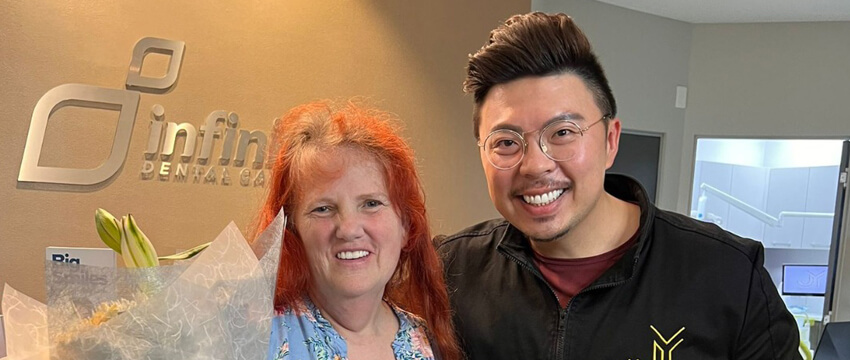A dental implant bone graft is a procedure that some people may need if their jawbone is not healthy enough to hold a dental implant. It’s a straightforward dental procedure that’s often performed simultaneously with implant placement. But what exactly is bone grafting, and when is it necessary? You should get a free consultation at your local dental clinic to find out more, but our summary will provide you with an overview.
What is bone grafting?
A bone graft is a procedure in which bone is added to an area of the jaw where there is insufficient bone to support a dental implant. This can be due to previous tooth loss, injury, or congenital conditions. Bone grafting helps to build up the jawbone with healthy cells and improve the bone’s density.
There are several types of bone grafts, including an autogenous bone graft, which uses bone from another area of your body. This is usually taken from the hip or tibia. In dentistry, it is commonplace for an allograft, or synthetic bone graft, to be used, and this is typically made from coral or hydroxyapatite.
Why do I need a dental implant bone graft?
Bone loss in the jawbone
Bone loss in the jawbone is the most common reason that bone grafting is needed to support dental implants. But why would the jawbone have bone loss?

When a tooth is lost, the bone that once supported that tooth starts to resorb or dissolve away. This process can happen quickly, or it can happen slowly over time. With each tooth that is lost, the jawbone gets a little weaker and a little more hollowed out. Bone resorption is a natural healing process after tooth loss, but teeth are responsible for stimulating the jawbone to produce healthy, new cells. Once the tooth is lost, the bone stops producing new cells in that area, and the bone begins to wither away.
The good news is that dental implants act the same way as a natural tooth root by stimulating the jawbone and helping maintain jawbone health.
When there’s insufficient space between the maxillary sinus and the upper jaw
Even with good bone density, in some cases, the sinus is too close to the upper jaw, which makes placing dental implants challenging. A sinus lift is a surgery that makes it easier to place dental implants by increasing the amount of bone in the upper jaw. The sinus lift procedure involves the placement of bone graft material into the sinus cavity, which helps to raise the sinus floor and improve the support for dental implants.
How do I know if I need a dental implant bone graft?
Find out more by scheduling an appointment with a dentist that offers free consultations. The dental implant process is meticulous to ensure you are a good candidate for the treatment. As well as an in-depth discussion about your general health and an examination, x-rays and CT scans are taken to enable us to determine the health of your jawbone. If your jawbone shows signs of bone loss or your sinus is too close to your upper jaw, we may offer you bone grafting so you can still have a dental implant.
What should I know about the bone grafting procedure?
- Dental implants may be placed at the same time as a bone grafting procedure, or the graft may be carried out separately. If the latter is the case, the dental implant must be placed within 12 months, or the body will resorb the bone graft. Typically, dental implants can be placed with minor bone grafts rather than major grafts.
- Bone grafting is carried out under a local anaesthetic and can take a couple of hours to complete. For patients who are nervous about the procedure, conscious sedation is an option.
Recovering from dental implant bone graft surgery
One of the myths about bone grafting is that it is very painful and needs a lengthy downtime. As with any surgery, you are likely to experience discomfort for at least a few days after the bone grafting procedure, but pain medication should ensure that you are not in pain.
Following surgery, you may experience swelling and bruising that should reach a peak after three days and then begin to subside. You will need to modify your diet by eating only soft foods until your mouth starts to heal, but after a few days, you should be able to return to non-strenuous, everyday activities.
 Is bone grafting worth it?
Is bone grafting worth it?
Absolutely. For anyone who wants dental implants but does not have sufficient jawbone, bone grafting is the only way to restore damaged bone and build it up, so it has enough density to hold an implant.
The results from a bone graft last a lifetime. Once a dental implant is placed, the jawbone will be stimulated to produce healthy new cells to maintain the jawbone and keep the implant firmly in position.
Bone grafting can help preserve aesthetics. By preventing bone loss, rigid bone and teeth fully support the soft facial structures. This prevents the tissues from sinking if the underlying support is absent, resulting in a prematurely aged look.
The Bottom Line
A dental implant bone graft is nothing to be worried about—and although it is another step in the dental implant process, in the long term, it is certainly worth it. Get a free dental consultation near you by scheduling an appointment with us at Infinity Dental Care or call on (02) 9159 6237 to learn more.
Note: Any surgical or invasive procedure carries risks. Before proceeding, you should seek a second opinion from an appropriately qualified health practitioner.
References
Mayo Clinic: Periodontitis
https://www.mayoclinic.org/diseases-conditions/periodontitis/symptoms-causes/syc-20354473
Colgate: Bone resorption: Why it happens and what to do next
https://www.colgate.com/en-us/oral-health/mouth-and-teeth-anatomy/bone-resorption-why-it-happens-and-what-to-do-next
Colgate: Sinus lift surgery: Answering common questions
https://www.colgate.com/en-us/oral-health/implants/sinus-lift


 Is bone grafting worth it?
Is bone grafting worth it?